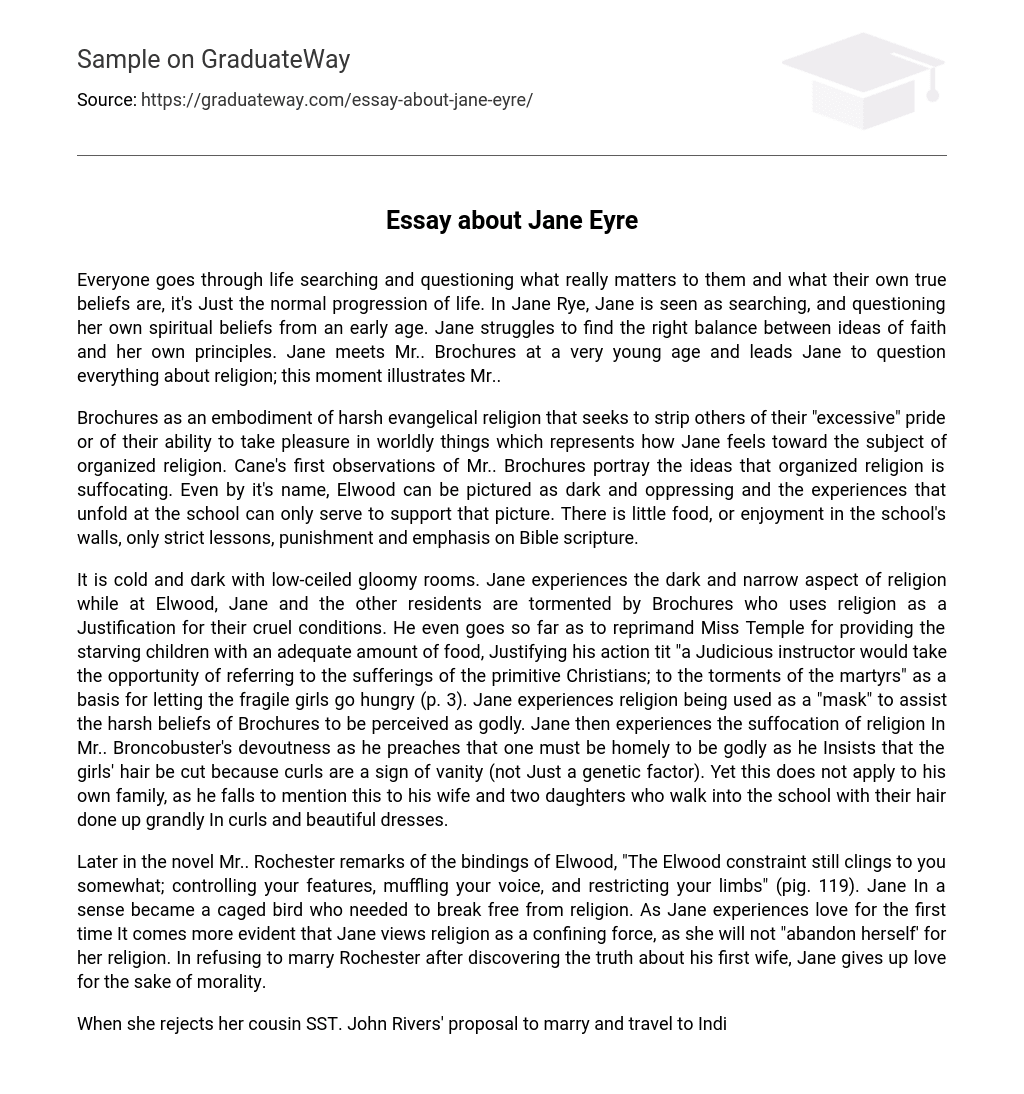Everyone goes through life searching and questioning what really matters to them and what their own true beliefs are, it’s Just the normal progression of life. In Jane Rye, Jane is seen as searching, and questioning her own spiritual beliefs from an early age. Jane struggles to find the right balance between ideas of faith and her own principles. Jane meets Mr.. Brochures at a very young age and leads Jane to question everything about religion; this moment illustrates Mr..
Brochures as an embodiment of harsh evangelical religion that seeks to strip others of their “excessive” pride or of their ability to take pleasure in worldly things which represents how Jane feels toward the subject of organized religion. Cane’s first observations of Mr.. Brochures portray the ideas that organized religion is suffocating. Even by it’s name, Elwood can be pictured as dark and oppressing and the experiences that unfold at the school can only serve to support that picture. There is little food, or enjoyment in the school’s walls, only strict lessons, punishment and emphasis on Bible scripture.
It is cold and dark with low-ceiled gloomy rooms. Jane experiences the dark and narrow aspect of religion while at Elwood, Jane and the other residents are tormented by Brochures who uses religion as a Justification for their cruel conditions. He even goes so far as to reprimand Miss Temple for providing the starving children with an adequate amount of food, Justifying his action tit “a Judicious instructor would take the opportunity of referring to the sufferings of the primitive Christians; to the torments of the martyrs” as a basis for letting the fragile girls go hungry (p. 3). Jane experiences religion being used as a “mask” to assist the harsh beliefs of Brochures to be perceived as godly. Jane then experiences the suffocation of religion In Mr.. Broncobuster’s devoutness as he preaches that one must be homely to be godly as he Insists that the girls’ hair be cut because curls are a sign of vanity (not Just a genetic factor). Yet this does not apply to his own family, as he falls to mention this to his wife and two daughters who walk into the school with their hair done up grandly In curls and beautiful dresses.
Later in the novel Mr.. Rochester remarks of the bindings of Elwood, “The Elwood constraint still clings to you somewhat; controlling your features, muffling your voice, and restricting your limbs” (pig. 119). Jane In a sense became a caged bird who needed to break free from religion. As Jane experiences love for the first time It comes more evident that Jane views religion as a confining force, as she will not “abandon herself’ for her religion. In refusing to marry Rochester after discovering the truth about his first wife, Jane gives up love for the sake of morality.
When she rejects her cousin SST. John Rivers’ proposal to marry and travel to India with him as a missionary, she relinquishes religion In favor of her own life. Jane believes that neither of these marriages, at least given the context In which they are offered, will allow for her Independence. Jane understands that her position Is Inferior to that of her would-be husband and that, were she to marry him, he would quickly come to feel that he had, In a sense, bought her.
There Is a turning point for Jane In relation to SST John where she must choose to submit to the “will of God” or malting her autonomy. If religion had been Cane’s core, would she have said, “l broke from SST John, ascendancy. ” (p. 358)? Arguably, because she turns away from SST John and towards a relationship where she can be held as an equal and maintain her agency to some agree, this is evidence to support that Jane sees a life as a religious missionaries life as constricting and thus she could not be happy with SST.
John. The depictions of organized religion as suffocating throughout the novel help to emphasize Cane’s growth in her own idea of spirituality and that a strict religion and faith are not the same. Though her devotion is much quieter than that of Mr.. Brochures; Jane, like many of us searches for a virtuous faith that does not consume her individual personality and prevent her happiness.





